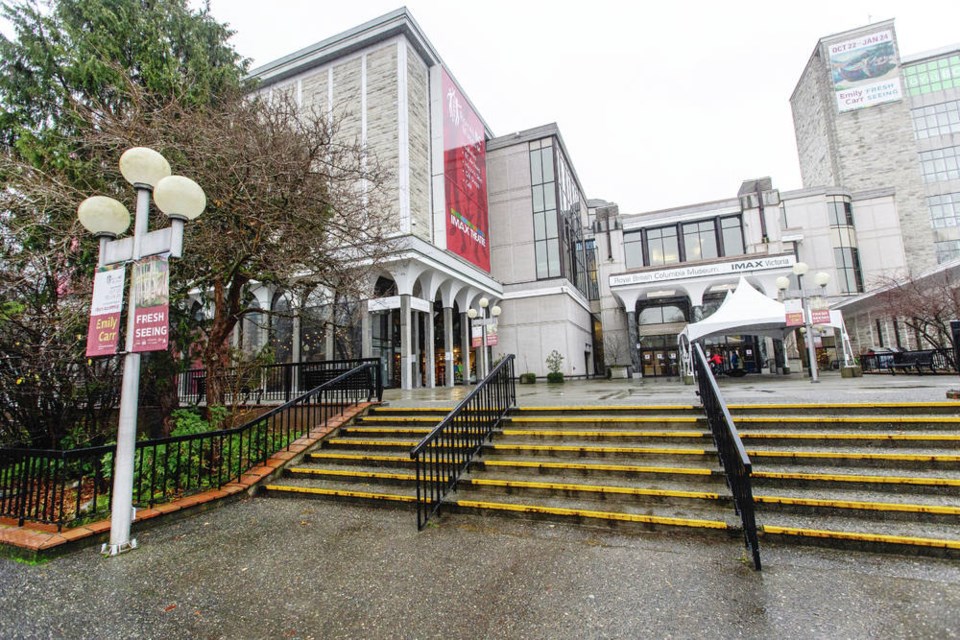Results of an internal survey of Royal B.C. Museum staff, sparked by the resignation of a prominent Indigenous employee in July who cited a culture of racism and discrimination in her farewell speech, “are not good,” according to museum board chairman Daniel Muzyka.
“I think, as we expected for an organization going through this process, staff are feeling upset and that showed in the survey results,” Muzyka said.
Muzyka declined to be specific about what was said in the survey, saying the organization needs time to process them. The results will help the museum determine where issues exist and how to address problems, he said.
The survey was conducted by diversity and inclusion consultant Alden Habacon, who was hired in response to Lucy Bell’s resignation as head of the Indigenous collections and repatriation department.
An independent investigation is also underway.
Bell, a member of the Haida nation, told her colleagues in a July 24 speech that she was leaving for her well-being and cultural safety, and called on the institution to accept that change is needed to become a welcoming place for people of colour.
She called out colleagues and executives, listing examples of racist comments she heard during three and a half years at the museum, and saying what she experienced could not solely be chalked up to systemic racism.
“It is also very personal racism. It’s also outright discrimination, white privilege, bullying and micro-aggressions happening here; that happen every day,” she said in her speech, which she provided to the Times Colonist.
“I have felt it continuously … from executive and from other colleagues and I just could not admit that was going on. It has taken me 3½ years years to admit what was going on. I have finally admitted to myself that there is a serious problem here.”
Bell said she resigned after an anti-racism Zoom seminar, held in response to George Floyd’s killing and the Black Lives Matter movement, in which someone in her group claimed “it is proven science that native people can’t tolerate alcohol.”
In her speech, Bell gave examples of comments she heard at the museum, including staff questioning why they had to consider diversity when they were “so busy,” claims that hiring Indigenous people is “reverse racism,” and that “there’s no such thing as racism.”
Bell said one colleague told her: “I understand what you’re going through. I’ve been discriminated against for the colour of my hair for all my life.”
She said she reported the racist comment made in the anti-racism session to CEO Jack Lohman.
“This was not the first time I have reported such things to him and my complaint did not go anywhere as I have experienced before. That for me was the last straw,” Bell said in an email.
Lohman, who joined the museum in 2012, is also president of the Canadian Museums Association board of directors.
An interview request sent to Lohman in September was acknowledged by a museum spokesperson, who directed questions to board chair Muzyka.
Muzyka said he was on the line listening when Bell gave her farewell speech, and it was the first he or any board members were aware of the accusations.
“I was very disappointed and sad,” he said in September.
Within days of Bell’s speech, the board met to launch a formal Public Service Agency investigation.
Muzyka said the PSA investigator will talk to anyone at the museum they need to, and it will take months before a full report is ready. Some of that report will likely be made public, but findings that involve individuals will be withheld due to privacy legislation, Muzyka said.
Museum staff members have been told they are not authorized to speak publicly about the issue, but one employee said anonymously that the experiences Bell recounted represent a culture of racism that is both systemic and overt at the museum and that goes beyond her individual experience.
“We support Lucy and acknowledge that there is racism, both specific and systemic, and that we’re all too afraid to talk [publicly]. I think it’s quite important to get that out, that a lot of us feel that way,” the staff member said.
A “significant portion” of the staff signed a letter in support of Bell following her resignation, urging the museum to act quickly, the staffer said.
“These issues are not new. We’ve been trying to address them through official channels for several years, and nothing has come of it.”
Angela Williams, who retired from the museum in November 2018 after 15 years, was deputy CEO when Bell was hired to lead the new Indigenous collections and repatriation department.
Bell’s strong connections to Indigenous communities were critical in building the department, Williams said.
“I have so much respect for her. She has such high integrity, and high values and is so smart and so wise. This Indigenous program wouldn’t be as far along as it is without her,” she said.
Before joining the museum, Bell was a founding member of the Haida Heritage and Repatriation Society, coordinating the return of more than 500 Haida ancestors from museums throughout North America and the U.K.
Williams said Bell was an exceptional leader and she was disappointed when she learned why she was leaving the museum, adding the institution should not take the loss lightly.
Williams said she believes Bell’s resignation is an opportunity for the museum to create positive change.
“It just needs to do some hard thinking that this has brought to light and just do better,” she said.
Bell said the museum is capable of change, and she is buoyed by the fact that so many staff wrote to the board to support her. She called on the museum to commit to meaningful change.
“What I want you to do is to accept your white privilege to do something about it so no other Black, Indigenous, person of colour has to go through this,” Bell said in her speech.



